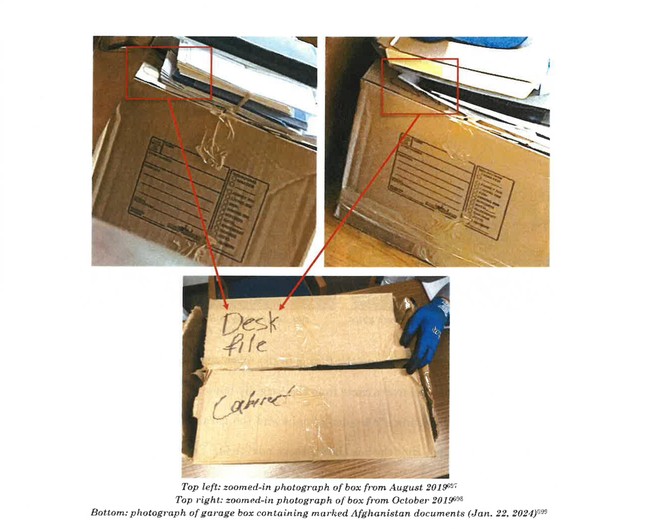
The deuce you say. It took several days, but NBC News’ Ken Dilanian reported today — on a weekend — that Robert Hur actually had a case against Joe Biden for felony violations of 18 USC 793. Dilanian refers to this as “one of the most surprising findings” in Hur’s report, but was it surprising at all?
To Democrats, Hur’s finding that there was no criminal case to bring against the president is the most important takeaway.
But to some national security experts, the disclosure that Biden told his ghostwriter that he discovered classified documents in his Virginia home in 2017 — with no indication he returned them — was unexpected and troubling. So was the revelation that Biden disclosed classified information to the ghostwriter on at least three occasions, and that he stored notebooks full of state secrets in unlocked drawers in his home office.
They said a senior government official like Biden should be held to a higher ethical standard than whether a jury would convict him of a felony.
“It may not be criminal, but it’s reckless and awful, because you have no idea what sources and methods you are putting at risk,” said NBC News legal contributor and former federal prosecutor Chuck Rosenberg. “Someone who served as the vice president of the United States should know better.”
Actually, Rosenberg should correct that, because some of those documents go back to Biden’s time in the Senate. And those weren’t just found at Penn’s Biden Center either, but in the garage of Biden’s Wilmington home. Hur’s report details the Senate records in a full chapter (Chapter 8, page 170), but discusses them briefly starting on page 27:
In Mr. Biden’s garage, agents found several documents with classification markings dating from Mr. Biden’s time in the Senate in the 1970s and 1980s. Some of those documents relate to foreign trips Mr. Eiden took as a senator, some of which he chronicled in his 2007 memoir, Promises to Keep. Agents found those Senate-era documents in a storage closet in Mr. Biden’s garage.
Why is this important? Senators and House members have no individual custodial authority over classified materials. To access classified material, they have to use an authorized secure facility and must leave the material in place. Presidents, vice presidents, and executive-branch officials do have individual custodial authority, but also cannot remove material from designated authorized secure facilities to keep them in non-secure areas. (This is why Donald Trump got charged, along with his refusal to cooperate in returning the material.) But a Senator had no authority to move them at all in the first place.
There is little doubt that Biden violated the law, and to the idea of that being a surprise, there hasn’t been any doubt about that since investigators started hauling boxes of these documents from Biden’s garage. The primary issue Hur raised was whether prosecutors could get a jury to convict Biden beyond a reasonable doubt based on a “willfulness” standard, as Hur outlines in the executive summary. This is the key distinction between Biden and Trump on this point; Biden cooperated with investigators while Trump not only balked but then allegedly obstructed a grand-jury subpoena to retain the documents. That goes a very long way to proving “willfulness” to a jury about the retention of classified material.
To put it another way: Had investigators found a stolen car in Biden’s garage, they may not have been able to convict him of the theft — but that doesn’t mean the theft didn’t occur. A crime was still committed that put stolen material in Biden’s garage. And they would still have to prove that Biden willfully housed the stolen car, which would be made much more difficult if Biden’s cognitive state was poor enough that it could be disputed that he even realized the stolen car was there.
But even that only goes so far. Under 18 USC 793, willfulness is an element of the crime, but there’s certainly evidence of it here as well. Biden ‘discovered’ classified material at his house in 2017, when he was out of office and not at all authorized to retain it. He commented about it to his biographer and then provided him access to the material, as Hur details in his report, even though the biographer was not cleared to access it. The failure at that point to notify the proper authority and transfer the material back is evidence of willful and unlawful retention. Hur downplays that in the report, but not in terms of its evidentiary value but because he believes that Biden’s cognition was impaired at that time too — or at least the defense would be able to argue it well enough to provide reasonable doubt to a jury.
That was Hur’s argument in essence on Biden’s forgetful-old-dotard appearance. That was the surprise, not the violations themselves, which were patently obvious from the time the records were seized. And let’s just remember that if a lesser official had done what Biden or Trump did, they’d have already been prosecuted for it. Just ask David Petraeus, whose crime also involved a biographer, among other more salacious differences, and who got a $40,000 fine and two years probation while pleading guilty to violating the law protecting classified material.
